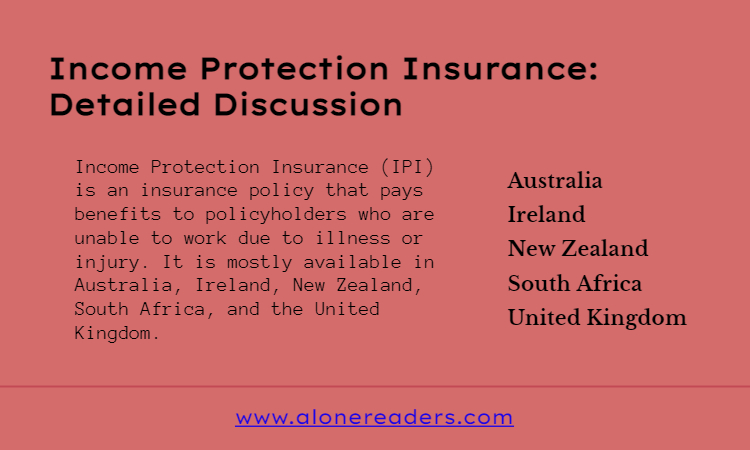
For certain workers, income protection insurance may not be necessary. Regardless of your situation, taking some time to contemplate how you would handle the unexpected loss of your income might be beneficial.
Should you become unable to work, income protection insurance works as a safety precaution to reduce stress.
Income Protection Insurance (IPI) is an insurance policy that pays benefits to policyholders who are unable to work due to illness or injury. It is mostly available in Australia, Ireland, New Zealand, South Africa, and the United Kingdom. Income Protection Insurance policies were formerly called Permanent Health Insurance (PHI). Disability income insurance (disability insurance) is a US implementation of the same idea.
In the event of a whole or partial disability that limits the ability to work, income protection insurance, a type of life insurance, is intended to safeguard the worker. In the standard work terms, income protection will replace a portion of your income while you heal or find a new job.
You might not think that you need income protection insurance if you work in a normally safe setting and don't face a serious health risk. The relevance of income protection insurance may, however, be greater for high-risk professions like trade employment.
Obviously, the insurance you select will have an impact on the wage % and length of coverage (benefit period). The best sort of income protection insurance should be determined as well.
Income protection insurance covers the following if you become totally or partially disabled and are unable to work:
Based on your annual earnings in the 12 months preceding to your illness or injury, income protection insurance is intended to replace your lost income.
Before filing a claim, the requirements for each income protection policy's definition of partial or total disability must be satisfied. Examine the product disclosure statement or the insurer's website.
Even while it can be wiser to approach income insurance broadly, there are several more specific insurance solutions that are worth looking into during the research stage. These types consist of, among others:
There are several other types of income protection insurance available, each providing varying levels of protection for distinct areas of concern. A more specific level of protection can be required, for instance, if you work for yourself. An ideal starting step might be to explain your situation to your insurance company.
Income protection coverage is crucial if you:
Create a budget to determine how much income protection you require. This will make it easier for you to see your monthly costs and the lost income. Paying into your superannuation may also be something you want to consider.
Moreover, take into account:
If you need help figuring out if and how much income protection insurance you need, talk to a financial counselor.
You should consider a variety of things while choosing an income protection policy, such as:
Before your payments can start, this time frame applies. Typically, income protection insurance includes waiting periods of 14 days to two years.
If your illness or disability prevents you from working, the benefit term is the period of time during which you will continue to receive monthly payments. The majority of income protection policies offer coverage for two, five, or up to a specific age (such as 65).
The following factors determine how much income protection insurance costs:
You can buy income protection insurance from:
You can typically deduct the premiums you pay for income protection insurance that is carried outside of super. Plans that are not super policies typically offer a higher level of coverage as well as more features and advantages.
You should browse around to find the best rate if you want to buy income protection insurance directly from an insurance provider. You can use a comparison website to do this.
If you are unable to work due to illness or disability, income protection insurance will pay you a regular income until you are able to find other employment or retire. Permanent health insurance is another name for income protection insurance. When deciding whether to purchase income protection insurance, you should compare it to other types of illness insurance.
Related Article: